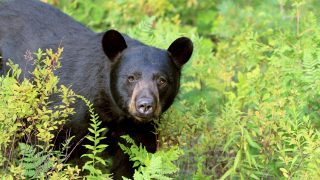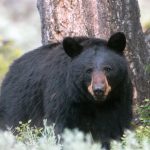
An Act Concerning the Feeding of Black Bear (New Jersey)
A.360/S.765
This important “Bear Smart” bill aims to protect black bears in New Jersey by preventing unintentional feeding, a root cause of human-bear interactions.
Status
New Jersey’s black bears are at risk — and an important state bill would help protect them and prevent human-bear encounters.
Current New Jersey law prohibits intentionally feeding black bears. That’s a good first step in preventing them from becoming habituated to human-sourced food, but it doesn’t go far enough. The “Bear Smart” bill, A.360/S.765, would clarify and expand the law to also prohibit the unintentional feeding or luring of black bears, through activities such as baiting white-tailed deer or leaving dog or cat food outside overnight in areas known to be frequented by bears.
New Jersey: Bears Need Protection
Urge your New Jersey lawmakers to support “Bear Smart” legislation! This will protect black bears by prohibiting intentional and unintentional bear feeding to reduce human-bear encounters.
When bears wander into human neighborhoods, they’re typically drawn by easily accessible food, such as unsecured trash cans, companion animal food, and low-hanging bird feeders. Bears who eat these human-sourced foods — or piles of sugary baits left by hunters who bait deer and other animals — can become habituated to and dependent on them, rather than their natural diet. Science also shows that human-linked food sources can affect the biology of black bears in ways that are contrary to sound ecological management principles.
Stopping human-bear encounters before they happen is the safest option for residents and bears alike — and research has shown that the most humane and effective way of doing this is by securing human-linked sources of food. A.360/S.765 would replace the current law’s blanket exemption for the unintentional feeding of black bears with a narrower, more specific set of exemptions. Activities that would not be considered bear feeding under the bill include:
- Actions of people licensed to possess wild animals, such as wildlife rehabilitators.
- Keeping crops, animal feed, or other agricultural items “on the premises of any person engaged in agricultural or horticultural activities.”
- Maintaining a bird feeder from April through November, as long as it meets certain criteria, such as being kept at least 10 feet above the ground to help prevent bears from accessing it.
- The outdoor feeding of animals such as those in municipal animal shelters, managed community cat colonies, or companion animals in private homes, “provided that any uneaten food is removed every night.”
- Wildlife-management or scientific activities by federal, state, or local authorities that involve feeding or attracting bears.
This legislation was introduced by Assemblymember Sterley S. Stanley (D-16) and Clinton Calabrese (D-36), and State Sens. Gordon M. Johnson (D-37) and Andrew Zwicker (D-16).
“We are committed to nonlethal, humane but smart and safe means to control the [black bear] population,” Gov. Phil Murphy has said of his opposition to the inhumane bear hunts that have previously taken place in the state. New Jersey’s bears have long been under attack by trophy hunters — but in 2021, Gov. Murphy did not allow a black bear hunt to take place, pledging that such a hunt would not happen as long as he’s in office. The Animal Legal Defense Fund applauds the decision to protect bears and base a management plan on sound scientific principles. Enacting “Bear Smart” legislation is an important part of the humane path forward.
The Animal Legal Defense Fund strongly supports A.360/S.765, and New Jersey residents can take action by urging their lawmakers to pass this commonsense bill.
For more information about New Jersey’s animal protection laws and additional opportunities to take action for animals in the state, visit aldf.org/newjersey.
New Jersey: Bears Need Protection
Urge your New Jersey lawmakers to support “Bear Smart” legislation! This will protect black bears by prohibiting intentional and unintentional bear feeding to reduce human-bear encounters.


